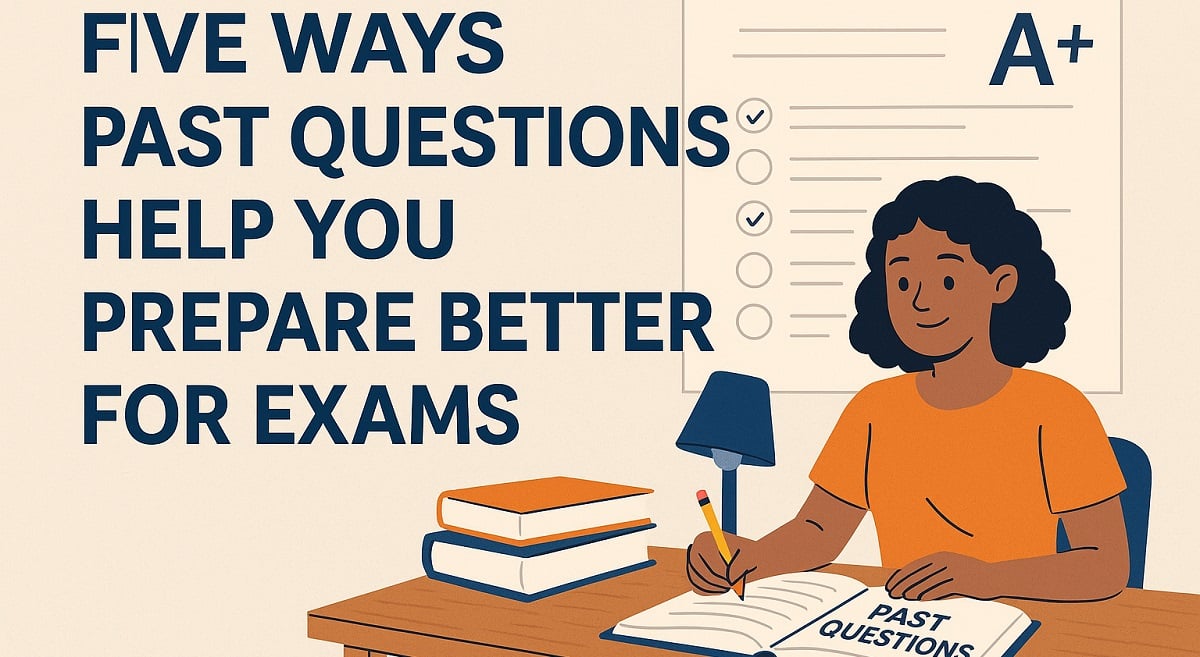Apr 24 , 2025

The mountain of material to study often makes preparing for exams feel overwhelming. Students approach this using different strategies. While some just bury themselves deep into the textbooks, others may join study groups or rely on watching video tutorials. Among these methods, using past questions stands out as one of the most effective study techniques for examinations. This involves reviewing previous exam papers to get a feel for the questions that usually come up.
This article explores five key ways past questions can help enhance your exam preparation and academic performance. Let's dive right in!
Every exam has its style, pattern, and focus. Some exams are heavy on theory-based questions, while others might be more inclined toward practical applications or problem-solving. Knowing what to expect helps you approach your studies more strategically instead of just reading blindly.
That's where past questions come in. When you study past exam papers, you start to notice certain patterns. You'll begin to see which topics keep showing up, the formats questions usually take, whether multiple choice, short answers, essays, etc., and what your instructors or examiners tend to emphasize.
Overall, using past questions allows you to focus your efforts on areas that matter. It also boosts your confidence in knowing what to expect. It's like playing a casino game like online JetX in practice mode and getting familiar with the mechanics before you put real money on the line.
As mentioned, one major benefit of using past questions is the confidence boost it gives you. Let's be honest: exam anxiety is real, and most students feel some level of nervousness walking into the hall. One of the biggest causes of that anxiety is uncertainty. What kind of questions will I get? What if it's all areas I didn't focus on? This mental pressure can affect your performance, even if you've studied hard.
But when you've worked through past exam papers ahead of time, you tend to feel more at ease. You're no longer stepping into the unknown because you've already seen how the questions are usually framed, the language used, and the structure of the paper. That familiarity helps calm your nerves and gives you a sense of control.
Most exams don't just test what you know; they also test how quickly you can communicate that knowledge. So, it's not enough to have the right answers; you need to be able to deliver them within a limited time frame. There have been countless cases where students knew the answers but ran out of time to finish the paper. Hence, time management is one of the most important skills to develop when preparing for any exam. Practicing with past questions can help you build that skill.
When you use past exam papers as part of your study routine, try to time yourself as you answer them. Find out how much time is usually allocated for the actual exam, then stick to that limit as closely as possible. It gives you a feel for the time pressure you'll face and trains you to work within it.
Over time, you'll get better at pacing yourself, knowing when to spend more time on a question and when to move on. You'll become more efficient at organizing your thoughts, writing clearly, and finishing strong without rushing through the last few questions or leaving anything blank.
One of the biggest mistakes students make is assuming they're ready just because they've gone through the material. Studying isn't, however, the same as knowing, and definitely not the same as being able to apply what you've learned under exam conditions. Practicing with past questions gives you a reality check. It shows you what you've truly mastered and where you still need work, giving you unbiased feedback about your level of readiness.
Even if you know a topic in and out, how a question is phrased can still catch you off guard. Some examiners like to get a little creative. They might twist a question slightly or include subtle tricks that can lead you to the wrong answer if you're not paying close attention. In some cases, you might not even understand what the question is really asking, not because you didn't study but because you haven't seen that style of questioning before.
Practicing with past questions exposes you to various ways the same question can be framed. It helps you get better at reading between the lines, understanding what's being asked, and avoiding common traps.
Overall, studying past questions will help you become a more flexible, adaptable, thoughtful, and strategic exam candidate. Instead of panicking when a question looks unfamiliar, you'll be confident to break it down and tackle it with clarity.
Using past questions in your exam preparation can make a world of difference. It helps you understand the exam format, clearly understand what to expect, and improve your time management. It also lets you know how ready you are and where you might need more practice.
That said, it is essential to note that past questions should guide your study, not replace it. The goal isn't just to memorize answers to past questions but to understand how the material is typically tested. It's more or less like a map. It doesn't walk the journey for you but helps you stay on the right path.